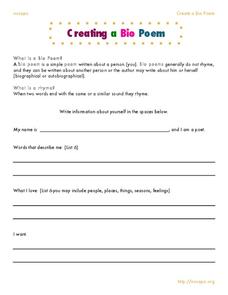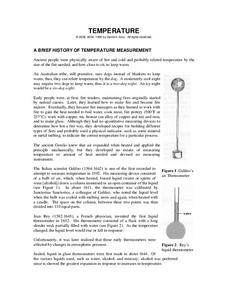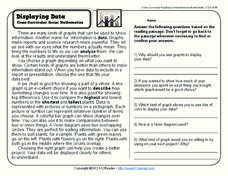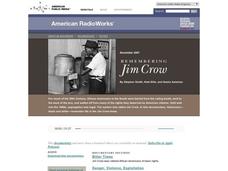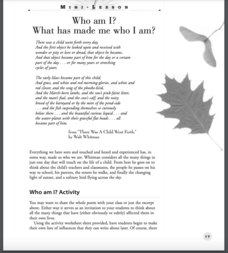K12 Reader
Inference Practice: Who Am I?
Have a little fun teaching your class about inferences with this short and simple guess who exercise. Provided with five short passages describing different types of people, young learners must read each one and use the included details...
Student Handouts
Working with Primary Sources: The Spanish-American War
Examine the introduction to Our Islands in Their People, written by Major-General Joseph Wheeler. The excerpt, which is about two-and-a-half pages long, is included here along with six questions about the text. Pupils can learn about the...
Inside Mathematics
Conference Tables
Pupils analyze a pattern of conference tables to determine the number of tables needed and the number of people that can be seated for a given size. Individuals develop general formulas for the two growing number patterns and use them to...
WITS Program
Whoever You Are
Deep down, everyone is the same. Discuss the similarities and differences between people across cultures with a series of reading activities based on the beautiful story and illustrations in Whoever You Are by Mem Fox.
Curated OER
Words Can Hurt; Words Can Help
Help learners on the autism spectrum comprehend the social consequences of their actions by connecting kind and hurtful words to physical, tangible experiences. The worksheets in this resource prompt students to consider things they say...
Balanced Assessment
Confetti Crush
In the first part of a middle school assessment task, learners analyze a given statement about the amount of confetti revelers throw at Times Square on New Year's Eve. The second part of the task requires learners to identify objects...
EngageNY
Writing and Evaluating Expressions—Multiplication and Addition
How many people can sit around a table? The 22nd part in a series of 36 continues the work on writing and evaluating expressions to include expressions with two operations. Pupils use models to determine an expression for the number of...
Concord Consortium
You Are What You Drive
Grab the wheel in learning about functions. A short performance task challenges young mathematicians to develop a function that describes the cars eight people drive. They consider whether the inverse of the function exists. If not, they...
English Linx
Circling Adverbs Worksheet
A great way to effectively teach adverbs! Young grammarians circle adverbs in 15 different sentences. Next, they underline the verb that the adverb describes.
EngageNY
Real-World Positive and Negative Numbers and Zero II
Continuing from the previous lesson in the series, scholars learn to use positive and negative integers to describe real-world situations. In groups, they come up with their own situations for given positive and negative integers.
Nosapo
Creating a Bio Poem
Find out what's special about your pupils with a fun biopoem activity! As they fill out their name, words that describe them, what they love, and what they dream of, learners create an expressive poem about themselves.
Polk Bros Foundation
Picture Planner
Show your class that there is more than one way to communicate an idea. Pupils note down their ideas and then brainstorm a few things they want to include in their pictures. Then, in the box provided, they sketch and describe their...
Chymist
Temperature
Three Dog Night isn't just the name of a band; it is also the way an Australian tribe, who used dogs to stay warm, would describe the temperature on a cool evening. After reading about many different ways of measuring temperature, the...
Concord Consortium
King for a Day
Rumor has it exponential functions help solve problems! In a kingdom filled with rumors, young scholars must determine the speed a rumor spreads. The ultimate goal is to decide how many people must know the rumor for it to spread to the...
Royal BC Museum
Kids Page - Whales
Read about the physical features of whales and how they are grouped according to their method of eating food. A neat activity is described on the page; consider carrying this out in class. The resource makes a nice addition to a lesson...
K12 Reader
Displaying Data
It's important to learn how to display data to make the information easier for people to understand. A reading activity prompts kids to use context clues to answer five comprehension questions after reading several paragraphs about...
K12 Reader
Self Reflection
Instill the positive study habit of reflecting on learning by reading this passage with your class. The passage describes how reflection can be a powerful learning tool, and how learners can start reflecting. After reading, class members...
Illustrative Mathematics
Bookstore Account
We use debt often to describe negative numbers and your learners will be able to see how it translates into math. They will be asked to go through a series of transactions and make simple equations for each one, following it with a...
K12 Reader
Inference in Literature: The Wizard of Oz
We're off to see the wizard! Practice making inferences in literature with two sample paragraphs from L. Frank Baum's The Wonderful Wizard of Oz. Each passage provides questions about the pleasantness of the place it describes, and kids...
Pearson Longman
Emotions Reading
Explore the many types of feelings and how people express them with a lesson compiled of kid-friendly activities that spark critical thinking, self-reflection, and reinforce language and writing skills. Scholars delve into the variety of...
Scholastic
Who Am I? What Has Made Me Who I Am?
"Everything we have seen and touched and heard and experienced has, in some way, made us who we are." Your young learners will use this resource to create lists of influences (people, animal, nature, places, etc.) in their lives and to...
Curriculum Corner
Native American Literature
Celebrate and honor Native American culture with this set of graphic organizers that showcases literature like The Girl Who Loved Wild Horses and A Boy Called Slow as well as three other Native American literature books. Learners compare...
Polk Bros Foundation
I Can Analyze a Story or History Completely and Carefully
Start off analysis of a text with a instructional activity that asks pupils to complete several tasks. Class members note down a couple of characters or people and their distinguishing traits, describe the most important event, summarize...
Mary Pope Osborne, Classroom Adventures Program
Mummies in the Morning Egyptian pyramids, hieroglyphics
Visit the Magic Treehouse and take your class on a trip through time with a reading of the children's book Mummies in the Morning. Using the story to spark an investigation into Egyptian culture, this literature unit engages...
Other popular searches
- Adjectives Describing People
- Writing Describing People
- Asl; Describing People
- Describing People Esl
- Ppt Describing People
- Idioms for Describing People
- Vocabulary Describing People
- Spanish Describing People
- Asl Describing People
- Describing People Worksheet
- Pot Describing People












